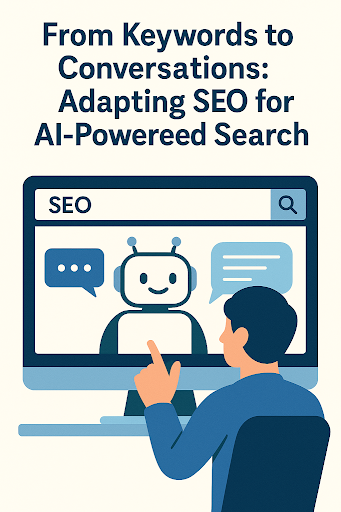If you’ve been paying attention, you’ve probably noticed that SEO isn’t just about plugging in keywords anymore. With SEO for AI-powered search becoming the norm, the rules are shifting. People don’t just search for exact terms, they ask questions, speak naturally, and expect smarter answers.
This new kind of search behaves less like an index and more like a conversation. And if you’re not adapting your SEO to that reality, your content might not show up when it matters most.
How SEO for AI-Powered Search Changes the Game
Search used to be pretty mechanical. You typed in two or three words, and the engine would serve up pages that matched those exact terms. But AI doesn’t play that way.
Now, when someone searches, tools like Google’s AI models try to figure out the meaning behind the query. They’re not just looking for keywords, they’re trying to understand intent.
This matters because:
- It’s not just what people type, it’s what they mean
AI models are trained to interpret full questions and conversational phrasing. If your content doesn’t speak the same way, it’s going to miss the mark. - Long-tail questions are getting more attention
Instead of just “best dog food,” users ask things like, “What kind of dog food is healthiest for older golden retrievers with joint issues?” Search engines can now handle that complexity. - Content quality has more weight
Pages written clearly, with a natural tone and helpful answers, tend to win. It’s less about stuffing keywords and more about being actually useful.
Search Engine Journal recently pointed out that successful SEO today relies more on understanding how AI thinks and less on gaming the system (source).
What This Means for SEO Strategy
If you’re still writing titles like “Best Pizza | Best Pizza Near Me | Cheap Pizza Deals,” you’re stuck in the past. That kind of content feels off when AI is trying to answer someone’s real-world question.
Instead, start thinking like a person, not a bot. Here’s how:
- Write like you speak
Imagine a user is sitting across the table asking about your topic. Would your article sound awkward to read out loud? If so, rewrite it. - Use real questions as headers
Not just for voice search, but because AI pulls these into featured results more often. “How do I…” and “What’s the best way to…” make great section openers. - Work in related terms, not just repeats
For AI-powered search to connect the dots, you need to include synonyms, relevant examples, and layered ideas. Don’t say “AI-powered search” ten times. Use phrases like smart search tools, conversational queries, and search assistants. - Link ideas within your site
A strong page helps, but it’s even better when it fits into a clear structure. Supporting blog posts, case studies, or FAQs make your site more trustworthy in the eyes of search systems.
Don’t Forget the Human on the Other Side of AI
At the end of the day, AI decides what to show, but humans decide what to click. That part hasn’t changed.
So yes, you want to show up for AI-powered search, but more importantly, you want to connect. That means being honest, being clear, and solving problems your audience actually cares about.
It also helps to be direct. Avoid jargon. Avoid fluff. And never assume your reader knows more than they do.
Getting Ready for What’s Next
Search engines will only keep getting smarter. If your strategy stays focused on humans, you’ll probably do fine, no matter how advanced the tech gets.
It’s a good time to update your approach, especially if your site hasn’t evolved in a while. If you’re ready to transform your search approach, now’s the time to lean into SEO for AI-powered search, not how they searched five years ago.



